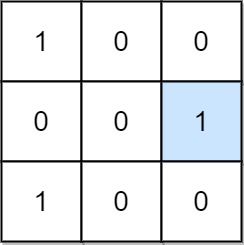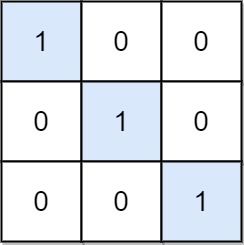Given an m x n binary matrix mat, return the number of special positions in mat.
A position (i, j) is called special if mat[i][j] == 1 and all other elements in row i and column j are 0 (rows and columns are 0-indexed).
Example 1:
Input: mat = [[1,0,0],[0,0,1],[1,0,0]] Output: 1 Explanation: (1, 2) is a special position because mat[1][2] == 1 and all other elements in row 1 and column 2 are 0.
Example 2:
Input: mat = [[1,0,0],[0,1,0],[0,0,1]] Output: 3 Explanation: (0, 0), (1, 1) and (2, 2) are special positions.
Constraints:
m == mat.lengthn == mat[i].length1 <= m, n <= 100mat[i][j]is either0or1.
class Solution:
def numSpecial(self, mat: List[List[int]]) -> int:
m, n = len(mat), len(mat[0])
r = [0] * m
c = [0] * n
for i, row in enumerate(mat):
for j, v in enumerate(row):
r[i] += v
c[j] += v
ans = 0
for i in range(m):
for j in range(n):
if mat[i][j] == 1 and r[i] == 1 and c[j] == 1:
ans += 1
return ansclass Solution {
public int numSpecial(int[][] mat) {
int m = mat.length, n = mat[0].length;
int[] r = new int[m];
int[] c = new int[n];
for (int i = 0; i < m; ++i) {
for (int j = 0; j < n; ++j) {
r[i] += mat[i][j];
c[j] += mat[i][j];
}
}
int ans = 0;
for (int i = 0; i < m; ++i) {
for (int j = 0; j < n; ++j) {
if (mat[i][j] == 1 && r[i] == 1 && c[j] == 1) {
++ans;
}
}
}
return ans;
}
}class Solution {
public:
int numSpecial(vector<vector<int>>& mat) {
int m = mat.size(), n = mat[0].size();
vector<int> r(m), c(n);
for (int i = 0; i < m; ++i) {
for (int j = 0; j < n; ++j) {
r[i] += mat[i][j];
c[j] += mat[i][j];
}
}
int ans = 0;
for (int i = 0; i < m; ++i) {
for (int j = 0; j < n; ++j) {
if (mat[i][j] == 1 && r[i] == 1 && c[j] == 1) {
++ans;
}
}
}
return ans;
}
};func numSpecial(mat [][]int) int {
m, n := len(mat), len(mat[0])
r, c := make([]int, m), make([]int, n)
for i, row := range mat {
for j, v := range row {
r[i] += v
c[j] += v
}
}
ans := 0
for i, x := range r {
for j, y := range c {
if mat[i][j] == 1 && x == 1 && y == 1 {
ans++
}
}
}
return ans
}int numSpecial(int **mat, int matSize, int *matColSize) {
int m = matSize;
int n = *matColSize;
int *rows = (int *) malloc(sizeof(int) * m);
int *cols = (int *) malloc(sizeof(int) * n);
memset(rows, 0, sizeof(int) * m);
memset(cols, 0, sizeof(int) * n);
for (int i = 0; i < m; i++) {
for (int j = 0; j < n; j++) {
if (mat[i][j] == 1) {
rows[i]++;
cols[j]++;
}
}
}
int res = 0;
for (int i = 0; i < m; i++) {
for (int j = 0; j < n; j++) {
if (mat[i][j] == 1 && rows[i] == 1 && cols[j] == 1) {
res++;
}
}
}
free(rows);
free(cols);
return res;
}function numSpecial(mat: number[][]): number {
const m = mat.length;
const n = mat[0].length;
const rows = new Array(m).fill(0);
const cols = new Array(n).fill(0);
for (let i = 0; i < m; i++) {
for (let j = 0; j < n; j++) {
if (mat[i][j] === 1) {
rows[i]++;
cols[j]++;
}
}
}
let res = 0;
for (let i = 0; i < m; i++) {
for (let j = 0; j < n; j++) {
if (mat[i][j] === 1 && rows[i] === 1 && cols[j] === 1) {
res++;
}
}
}
return res;
}impl Solution {
pub fn num_special(mat: Vec<Vec<i32>>) -> i32 {
let m = mat.len();
let n = mat[0].len();
let mut rows = vec![0; m];
let mut cols = vec![0; n];
for i in 0..m {
for j in 0..n {
rows[i] += mat[i][j];
cols[j] += mat[i][j];
}
}
let mut res = 0;
for i in 0..m {
for j in 0..n {
if mat[i][j] == 1 && rows[i] == 1 && cols[j] == 1 {
res += 1;
}
}
}
res
}
}

